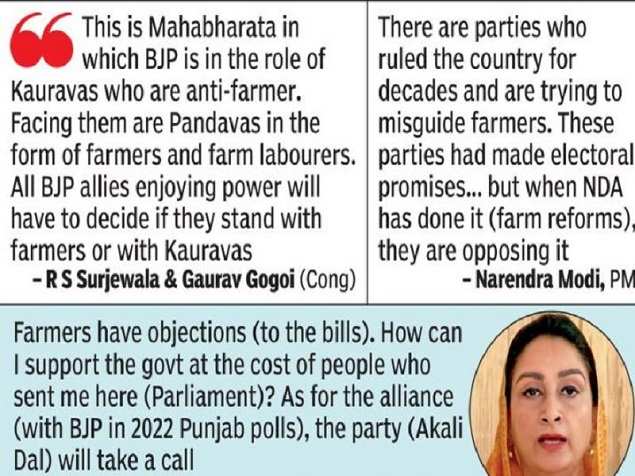
[ad_1]

He also assured farmers procurement of their produce under the minimum support price (MSP) regime would continue.
“Yesterday was a historic day for the country in the field of agricultural reforms. The agricultural reform bills have been passed which has liberated our farmers from many restrictions,” Modi said he said while addressing a virtual meeting after launching railway projects for poll-bound Bihar. “Middlemen used to take a major part of farmers’ profits. The bill will prove to be protective cover for farmers,” he added.
His remarks came after he forwarded the resignation of Akali Dal’s Harsimrat Kaur Badal as minister for food processing and amid Congress’s effort to step up its opposition to the troika of bills meant to reform trade in farm produce.
Congress called protests against the bills a “Mahabharata” for farmers and dubbed the Modi government as the “Kauravas”. It also sought to enlist allies by appealing to BJP’s coalition partners in Bihar and Haryana, JD(U) and JJP respectively, as well as regional formations YSRCP, TRS and AIADMK.
“This is Mahabharat in which BJP is in the role of Kauravas who are anti-farmer and facing them are Pandavas in the form of farmers and farm labourers. Congress is with the Pandavas. Now, all the BJP allies who are enjoying power will have to decide if they stand with farmers or with Kauravas,” party spokesperson R S Surjewala said.
Punjab CM Amarinder Singh claimed the legislations would lead to growing angst among people in the border state, “thus giving Pakistan the opportunity to stoke more fires”. He added that Delhi must rethink its “anti-farmer” move as it would undo the sacrifices made by Punjab and its farmers over the last 65 years to make India self-sufficient in food.
Harsimrat Badal justified her walkout and claimed that BJP had disregarded SAD’s demand for sounding out allies on the farm bills. “I kept on protesting ever since these ordinances were circulated for comments in the cabinet. I was acting like a bridge between farmers and the government to clear all doubts and fears of farmers. I kept on pleading that the government should not bring these bills until all apprehensions and fears of farmers are cleared,” she said.
“I feel very saddened about the fact that my voice was not heard in the cabinet and the government did not send it to a parliamentary select committee for consultations with all stakeholders, including farmers. If my voice had been heard, farmers would not have come out on roads to protest,” she added.
The day also witnessed BSP chief Mayawati opposing the bills as “anti-farmer”. “Two bills related to farmers were passed by Parliament yesterday without removing their doubts. BSP does not approve of this. What does the farmer of the country want? It would be better if the central government pays attention in this regard,” she tweeted.
Modi and BJP, however, remained unfazed, with the PM recalling Congress’s support to very same measures that his government has taken, and accusing it of opportunism. “There are parties, who ruled the country for decades, who are trying to misguide farmers. These parties had made electoral promises, these reforms were part of their manifesto but when the NDA has done it, they are opposing it,” the PM said, referring to Congress.
Modi asked farmers to beware of the lies being spread on behalf of middlemen.
BJP got assistance from its Haryana ally JJP which, defying the widely held expectation, refused to join the Akalis in opposing the three legislations. The party’s stand, announced by its leader Ajay Chautala, is significant because the Haryana outfit, just like the Akalis, draws its political sustenance from farmers.
Other BJP leaders, including party chief J P Nadda and home minister Amit Shah, remained on the offensive, standing by the legislations and attacking Congress.
Protests against the bills, which, put together, seek to liberalise farm trade by ending the monopoly of “mandis” and curbing the role of “arhatiyas” (middlemen), have so far been confined to the procurement zones of Punjab, Haryana and parts of western UP. They are unlikely to spread far and wide because of the meagre number of farmers who can produce marketable surplus.
Yet, aggressive protests in the capital’s neighbourhood would be bad optics for the government, especially at a time when it is grappling with the triple challenges of Covid-19, China’s aggression on the border and a contracting economy.
The government does seem to be alive to the risk and has moved in aggressively to rebut the suggestion that the reforms will mark an end of the minimum support price (MSP) regime. However, it is determined to stick to the course and aggressively take on the challengers.
[ad_2]
Source link